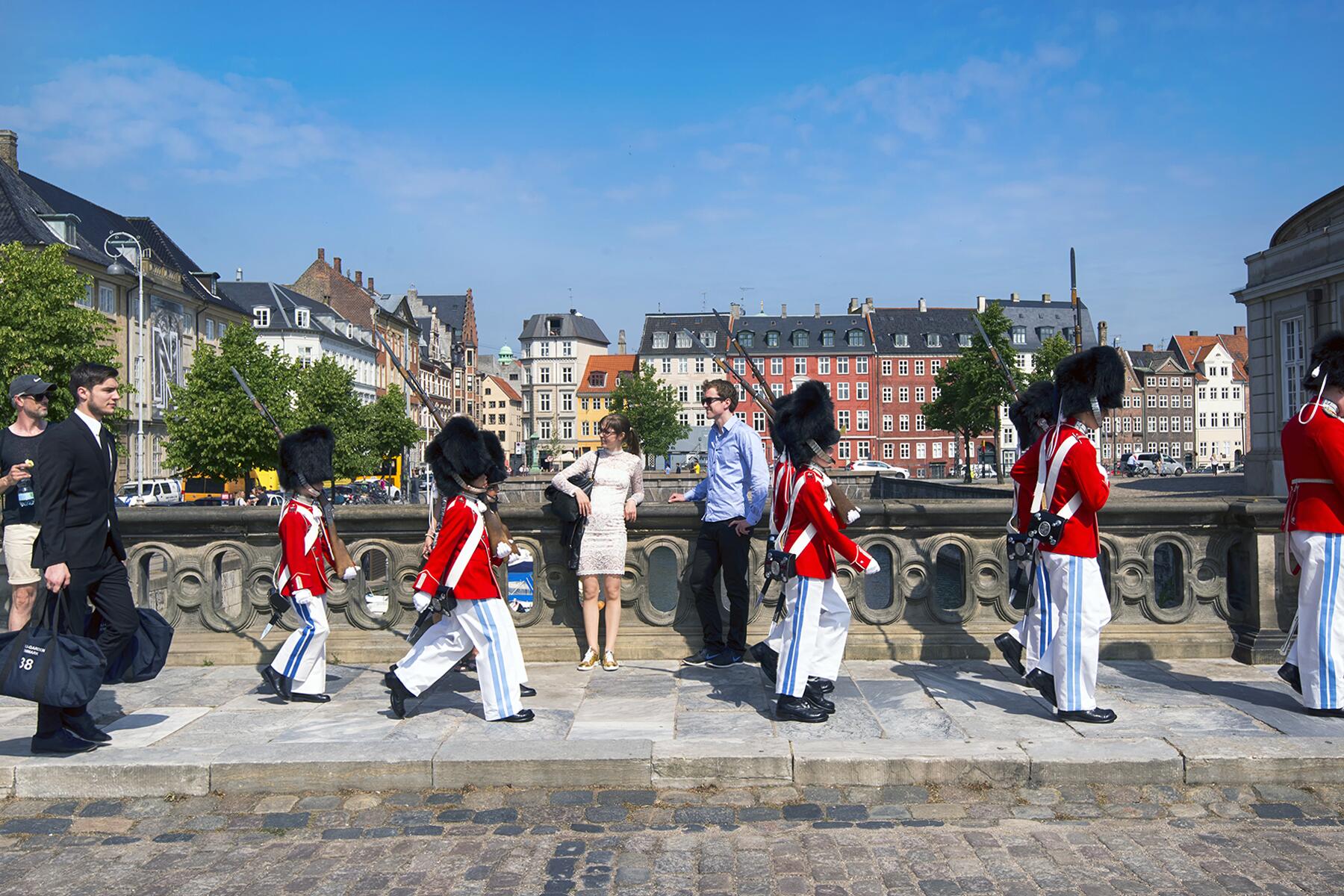Since 1844, children have patrolled Tivoli. And their origins have a curious connection to U.S. military tradition.
There is a regiment of shrunken soldiers in Denmark. They wear little red uniforms, carry real 1867 military rifles across their puny shoulders, sharp sabers dangle off dainty waists, and they march with the lock-step precision of a conquering Kaiser’s baby brute squad. It is a child army without warlords.
Every single traveler took a first trip at some point after the pandemic, or what we thought was “after” even if it wasn’t, we went somewhere for the very first time after the advent of the vaccines: I went to Copenhagen to research a book. To say I was unpracticed at travel in 2021 would be to say synchronized swimmers are unpracticed at pole vaulting. Travel had become a mystery, an unrecognizable sphere of discourse. In Denmark, I became a martian, a stranger in a strange land, confused, uncertain of my capacity for interpretation and sense-making. All at once, I had no idea what I was seeing abroad.
It was an autumn twilight in the Tivoli Gardens, Copenhagen’s urban amusement park. My book research was done for the day, I was contemplating a theme-park dinner of spicy sausage at Tivoli’s Daemon Grillen, where “few survive to tell the tale” of “Hot! Spice! And things Nice!” It is street meat that definitely “will blow your minds, hats, and socks off!”
Recommended Fodor’s Video
My Carlsberg in hand, before I committed to what is, I was told, a very Danish meal, I heard the distant call of pipes and drums, the clip-clop of boots, then, rounding a corner, I saw the elfin dragoons of the Tivoli Youth Guard. These children were so small, their furry bearskin hats were so tall, and their rifles so authentic, they looked both terrifying and hilarious. It was not just that the baby brigade were exact runty replicas of Queen Margarethe’s own bodyguards, who stomped with equal precision at Amalienbourg Palace, these kids could also really play music.
I, along with every other visitor at Tivoli, followed behind on their procession through the twilit gardens. We were happy vermin marching behind petite pied pipers. It turns out, Tivoli’s tot battalion is the most prestigious youth conservatory in Denmark, where eight-year-olds audition to become music mercenaries who play over 100 performances a year.

The Guard originated as a gift that Tivoli’s founder gave himself to celebrate the success of his amusement park on its first birthday, in 1844. I buy myself flowers. Georg Carstensen bought 30 little boys, in red uniforms with white tails, drums, massive black bear shako hats, and swords. And real rifles. The boys were paid in sandwiches and beer. Today, the children are all kicked out at 15, the age when American marching bands begin to recruit. There are now about 95 children in the Guard; they are today paid with a tuition-free, world-class music education as well as coveted season passes to the attraction that ranks among the Danes’ very favorite things, only behind sleek wood furniture and generous social democracy.
This troop of tune-playing toddlers was known as the Boy’s Guard as recently as 2015, when Tivoli finally let girls play too–the very same year the park canceled the coronation of a Tivoli Princess.
The Guard keeps Tivoli safe from…well…nothing. There is a giant wall around Tivoli. The gardens were originally built on the far edges of the city, but Copenhagen grew around the park such that now the roller coaster, the bear shooting gallery, the Nimb hotel, and commedia dell’arte pantomime theater are all dead center of the metropolis. Among the many geniuses of Tivoli’s artistically lit pleasure panoramas, it accomplishes what Times Square and Piccadilly Circus cannot, which is to keep glassy-eyed tourists barricaded from an otherwise sober center of commerce and culture.

Tivoli’s walls also keep drunk people inside. The night of my visit, this struck me as potentially alarming and certainly unwise: As the musical children’s crusade was promenading after dark, followed en masse by Danish families devouring licorice, and Scandinavian lovers hauling oversized stuffed Moomins, I saw that a band of rowdy, inebriated Vikings were chasing the infant infantry around the park too. Everywhere, Nordic giants were leaping over picnic tables, dodging strollers, braying at the top of their lungs the words to a song seemingly everyone else in the park also knew.
I did not. The words were Danish. I had never heard or seen anything like it before. The crowd found acceptable what looked to me like a children’s lynch mob. Everyone was happy. I was stumped and unnerved.
I witnessed an apparently violent spectacle at a garden where everything is otherwise beautiful, sensible, manicured, curated, elegant–a little too orientalist–but overall joyful. It was something like culture shock, that thing I hear about tourists fainting dead away when they first land in Kathmandu, overstimulated by the activity of an unfamiliar culture.
Tivoli’s armed, musical, nighttime kinder-cavort ended some 20 minutes after it began. The garden’s squadron of squirts retreated to its red brick headquarters the same way a cuckoo disappears into its clock.
Then there were fireworks: glorious eruptions of bombast and color that woke an entire city.
The roaming pack of wild, Scandinavian child-chasers went back to Tivoli’s beer gardens.
I flew home to resume writing my book.
But books take a long time to write. I’m still writing that book. When I returned to Copenhagen for another dip into the archives, I asked around: What was it I had seen that night at Tivoli?
“Oh, that was just Tappenstreg,” said Jan Ulrik Hansen, the Guard’s director, himself a former Guard Boy as well as dad to a former Tivoli Princess, and a graduating current member of the Guard. Hansen’s father, too, was a professional musician. As in military families, youth guarding runs in Danish families.
Tappenstreg, Hansen explained, happens every autumn at Tivoli Gardens, when the summer season comes to its close: Alumni of the Guard return, to drink, to chase young musicians who are about to play their last show of the summer, and to sing them all home. Those drunk and howling gangs were not Norse Gods, Loki and Thor, threatening mayhem but former musicians, all over 15 and too old now to march. They were returning to their happiest place, reliving their Youth Guard glory.
Every Dane knows about Tappenstreg rituals: Once upon a time, when Northern Europe was a collection of small principalities and private armies, long before the first unification of Germany, back even when Denmark was a major military power, armies sent officers around the barracks at night to make sure soldiers got to bed early enough for a morning assault on a neighboring kingdom. Officers circled to each pub and brothel to shut off the taps–to tap the kegs–so soldiers could stumble home: Tappenstreg.
This is also the origin of our song “Taps.” Tappenstreg might be new to me, but pretty much everyone on this side of the Atlantic knows the song, the sunset bugle song. Sometimes it even has words: “Day is done…gone the sun…from the lakes, from the hills, from the sky…” It is the simplest tune imaginable, the C-Major triad: C, E, G; a grand total of twenty-four notes long. Sunset. The flag is lowered and folded. The last, trumpeted note is held to the end of a breath. Last round, soldiers! Time for bed.
Those lilliputian cosplay military musicians and that gang of singing Ragnarok bullies remind me why travel is good, and why I missed it when we were grounded for so long: Traveling creates puzzles for the mind, it offers us a series of barely intelligible cues, we take in data, ask questions, maybe we stay long enough for the uncanny to become familiar. We leave our homes to learn. The foreign is always something in which we can become fluent–and maybe we always were.
All is well. Safely Rest. Tappenstreg!







Wonderful Article. Find another great piece of art here
https://techsunn.com/sky-cruise-the-flying-hotel-of-the-future-that-could-stay-airborne-for-years/